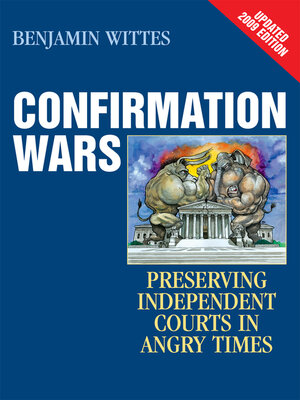Confirmation Wars
ebook ∣ Preserving Independent Courts in Angry Times · Hoover Studies in Politics, Economics, and Society
By Benjamin Wittes

Sign up to save your library
With an OverDrive account, you can save your favorite libraries for at-a-glance information about availability. Find out more about OverDrive accounts.
Find this title in Libby, the library reading app by OverDrive.



Search for a digital library with this title
Title found at these libraries:
| Library Name | Distance |
|---|---|
| Loading... |
Just in time for the first Supreme Court confirmation of the Obama administration, one of America's most insightful legal commentators updates the critically acclaimed Confirmation Wars: Preserving Independent Courts in Angry Times to place the nomination of Judge Sonia Sotomayor in the context of the changing nature of judicial nominations by recent presidents.
Our system has gone from one in which people like Sotomayor or recent highly qualified nominees like John Roberts and Samuel Alito are shoe-ins for confirmation to a system in which they are shoe-ins for confirmation confrontations. While rejecting parodies offered by both the Right and Left of the decline of the process by which the United States Senate confirms-or rejects-the president's nominees to the federal judiciary, Wittes explains why and how this change took place. He argues that the trade has been a bad one-offering only the crudest check on executive appointments to the judiciary and putting nominees in the most untenable and unfair situations.
Published in cooperation with the Hoover Institution
Our system has gone from one in which people like Sotomayor or recent highly qualified nominees like John Roberts and Samuel Alito are shoe-ins for confirmation to a system in which they are shoe-ins for confirmation confrontations. While rejecting parodies offered by both the Right and Left of the decline of the process by which the United States Senate confirms-or rejects-the president's nominees to the federal judiciary, Wittes explains why and how this change took place. He argues that the trade has been a bad one-offering only the crudest check on executive appointments to the judiciary and putting nominees in the most untenable and unfair situations.
Published in cooperation with the Hoover Institution







